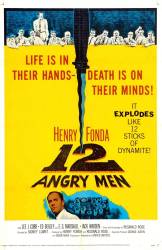Continuity mistake: Early in the film, Henry Fonda and another juror are in the men's room. When the other juror exits, the door is a swinging door. From the jury room the door is a regular door with a door knob. You can hear the door close when Henry Fonda exits and closes the door.

12 Angry Men (1957)
1 continuity mistake
Directed by: Sidney Lumet
Starring: Henry Fonda, Martin Balsam, Lee J. Cobb, John Fiedler, Jack Klugman, E.G. Marshall
Deliberate mistake: When Henry Fonda decides to recreate the old witness' ability to get to the door in 15 seconds, he asks another juror to time his walk. The scene never cuts away, but the juror who times it says it took 41 seconds when in reality it takes exactly 31 seconds, you can time it.
Juror #3: That business before when that tall guy, what's-his-name, was trying to bait me? That doesn't prove anything. I'm a pretty excitable person. I mean, where does he come off calling me a public avenger, sadist and everything? Anyone in his right mind would blow his stack. He was just trying to bait me.
Juror #4: He did an excellent job.
Trivia: This was the only film ever produced by Henry Fonda. The work of both acting and producing was so demanding that he said afterwards that he would never produce another film.
Question: Am I correct that when Henry Fonda is questioning the E.G. Marshall character about his recent activities Marshall says that the night before he worked until 8:30 then went home? The trial was every day for the past several days.
Join the mailing list
Separate from membership, this is to get updates about mistakes in recent releases. Addresses are not passed on to any third party, and are used solely for direct communication from this site. You can unsubscribe at any time.
Check out the mistake & trivia books, on Kindle and in paperback.




Answer: He was actually talking about the night before the last one. Trials, especially longer ones for serious crimes such as murder, are not usually on consecutive days...often there is a recess after the prosecution rests, and another after the defense, before closing arguments and the jury's deliberation. During those recesses, unless they are sequestered, the jury members would return to their normal lives (including work), and report back to the court when summoned.